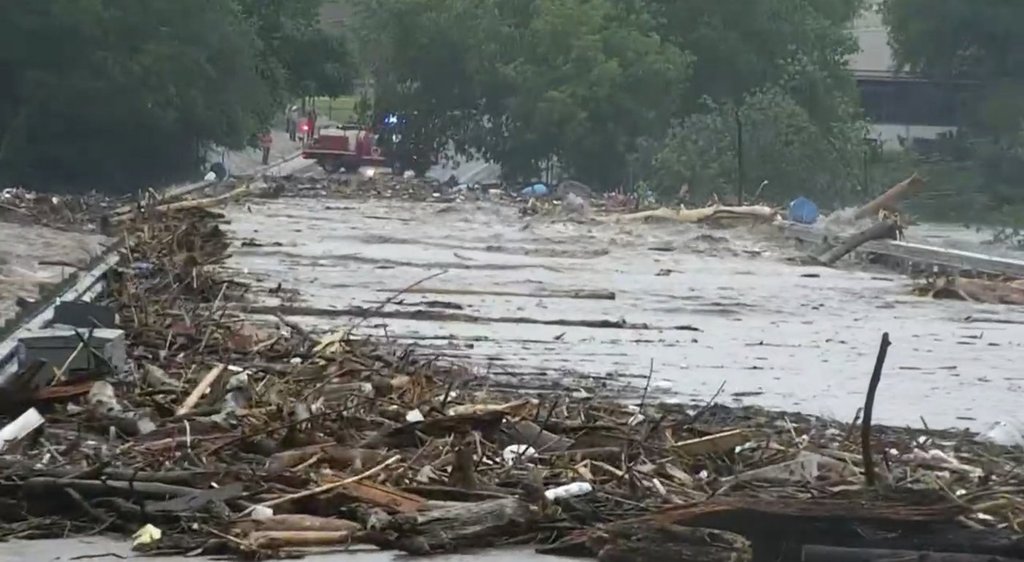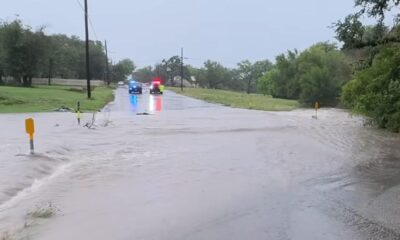Politics
Texas Floods Highlight Urgent Need for Improved Emergency Systems

A devastating flash flood struck central Texas on July 4, 2023, primarily affecting **Kerr County**. The disaster unfolded rapidly as heavy rain began around 03:00, causing rainwater to cascade down mountain slopes and leading to a swift rise of approximately eight metres in the **Guadalupe River**. As of July 14, at least **132 individuals** have been confirmed dead, with most casualties reported in Kerr County, where renewed flood warnings persist as additional heavy rain threatens the area.
In light of this tragedy, it is essential to analyze the factors contributing to the disaster. Texas Governor **Greg Abbott** announced plans for a special session of the state legislature later in July to investigate the emergency response to the flooding. This inquiry will delve into the effectiveness of local officials’ actions before and during the crisis.
Local officials in Texas are facing scrutiny regarding their preparedness for such an emergency. Over recent years, efforts to establish a robust flood warning system in Kerr County have faltered due to budgetary constraints. Following a deadly flood during Memorial Day in 2015, discussions arose concerning the installation of a flood monitoring system and emergency sirens. The tragic memory of an earlier flood in 1987, which resulted in eight fatalities, prompted some officials to advocate for these safety measures. However, the proposal encountered opposition from residents and elected officials who cited concerns over costs and potential noise from repeated siren alerts.
The urgency of timely communication during flash floods cannot be overstated. Unlike slower river floods, flash floods provide limited time for communities to react. This necessitates accurate short-term forecasting and community readiness. The **U.S. National Weather Service** issued its first public warning about the rising waters at 01:14 on July 4, categorizing the situation as life-threatening. A subsequent warning at 04:03 urged residents to “Move to higher ground now! This is an extremely dangerous and life-threatening situation.” Despite these alerts being broadcast through emergency management systems and media, many residents, including numerous children at summer camps, did not receive the critical information in time.
Effective collaboration among government agencies at all levels is vital to ensure that residents in flood-prone areas have the opportunity to evacuate or seek shelter in safer locations. The **World Economic Forum** has identified extreme weather events as the highest global risk for both 2024 and 2025. Floods, in particular, rank among the most significant of these events, with the **U.S. National Centers for Environmental Information** reporting that flooding incidents have resulted in an average cost of **$4.5 billion** per event between 1980 and 2024.
The recent Texas floods shine a light on the broader issue of funding cuts to critical agencies, notably the **National Oceanic and Atmospheric Administration (NOAA)** and the National Weather Services. These reductions have raised concerns about their impact on weather forecasting and flood alerts. Currently, the National Weather Services office for the Austin/San Antonio region, which includes Kerr County, lists **six out of 27 positions** as vacant, including the crucial role responsible for issuing warnings and coordinating with local emergency management officials.
The funding for research into weather systems, including floods, has also faced cuts. Proposals for deep funding reductions to NOAA could jeopardize vital research programs, such as the **National Severe Storms Lab** and the **Co-operative Institute for Severe and High-Impact Weather Research and Operations** at the University of Oklahoma, which are essential for understanding severe storms.
Turning to Canada, where flooding has consistently been the most frequent and costly natural disaster, the Canadian **Severe Storms Laboratory** was established in **2024** at **Western University** to advance research on severe weather. Over the past decade, floods in Canada have averaged nearly **$800 million** in insured losses annually. As climate change intensifies, the potential for extreme rainfall events is increasing, necessitating urgent action to address adaptation and climate resilience.
Unfortunately, many flood-risk maps in Canada are outdated, some dating back several decades. Although **Environment and Climate Change Canada** issues weather watches and warnings, it does not provide flood forecasts, as these are typically managed at the provincial level. This fragmented approach complicates efforts to prepare for future flooding events and underscores the need for cooperation among federal, provincial, and territorial governments.
As the frequency and severity of flooding events continue to rise, it is vital for Canada to learn from the recent tragedies in Texas. Enhancing flood monitoring systems, updating risk maps, and ensuring timely communication of emergency warnings will be critical in safeguarding communities from the impacts of extreme weather. Without proactive measures, the risks associated with flooding will only escalate in the years ahead.
-

 Politics4 weeks ago
Politics4 weeks agoSecwepemc First Nation Seeks Aboriginal Title Over Kamloops Area
-

 World5 months ago
World5 months agoScientists Unearth Ancient Antarctic Ice to Unlock Climate Secrets
-

 Entertainment5 months ago
Entertainment5 months agoTrump and McCormick to Announce $70 Billion Energy Investments
-

 Science5 months ago
Science5 months agoFour Astronauts Return to Earth After International Space Station Mission
-

 Lifestyle5 months ago
Lifestyle5 months agoTransLink Launches Food Truck Program to Boost Revenue in Vancouver
-

 Technology3 months ago
Technology3 months agoApple Notes Enhances Functionality with Markdown Support in macOS 26
-

 Lifestyle3 months ago
Lifestyle3 months agoManitoba’s Burger Champion Shines Again Amid Dining Innovations
-

 Top Stories2 months ago
Top Stories2 months agoUrgent Update: Fatal Crash on Highway 99 Claims Life of Pitt Meadows Man
-

 Politics4 months ago
Politics4 months agoUkrainian Tennis Star Elina Svitolina Faces Death Threats Online
-

 Sports5 months ago
Sports5 months agoSearch Underway for Missing Hunter Amid Hokkaido Bear Emergency
-

 Politics5 months ago
Politics5 months agoCarney Engages First Nations Leaders at Development Law Summit
-

 Technology5 months ago
Technology5 months agoFrosthaven Launches Early Access on July 31, 2025













